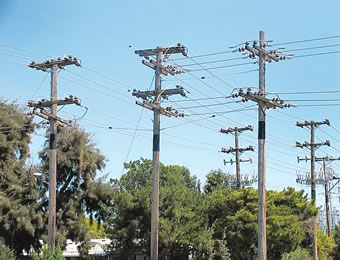The Federal Government (FG) in the 2019 proposed budget has earmarked the sum of N1 billion for the expansion and reinforcement of electricity distribution networks as against the initial N72 billion proposed for this course.
Also, in the proposed budget recently presented by the President Muhammadu Buhari before the National Assembly, the Federal Ministry of Power, Works and Housing set aside the sum of N5 billion for settlement of Ministry Departments and Agencies(MDAs) electricity debts.
The expansion of the distribution infrastructure according to the FG was borne out of the need to evacuate the controversial stranded 2,000 MWs and reduce the incidence of stranded power.
The FG and DisCos had been at loggerheads over the alleged stranded 2,000Mws of electricity due to constraints from the distribution network.
As a result, N72 billion investment in the distribution assets was proposed by the FG but in the newly proposed budget, only N1 billion was put aside for the purpose.
Recently, the Minister of Power, Works and Housing, Babatunde Fashola at the December 2018 Nextier Power Dialogue in Abuja, maintained that as a 40 per cent shareholder, it had to make the approval in order to enhance the distribution of power across the country.
He argued that operationally there was 7,000 Megawatts of electricity ready for deployment, but still constrained at the distribution end.
On the other hand, the umbrella body of the 11 distribution companies, Association of Nigerian Electricity Distributors (ANED) had countered FG’s claim, stressing that the purported stranded power is constrained by insufficient gas caused by inadequate and incomplete gas pipeline structure and the absence of a strong commercial framework.
ALSO READ: $5.8bn Mambilla power project suffers setback as Chinese sponsor stalls funding
It maintained that Government funds, based on a stranded 2,000 MW capacity that is constrained largely by factors other than distribution limitations (gas, frequency, line, hydro), should not be invested in a sub-sector that has been privatized.
“Premise or basis for the N72 billion investment, as proposed by the Ministry of Power, Works and Housing (MoPWH) has been the need to evacuate the “stranded” 2,000 MW of electricity that is constrained by distribution network limitations. As we have stated in a previous press briefing, there is no such thing, as painted by TCN and MoPWH.
“While the sector has an estimated available capacity of 7,000 MW, of which, on a daily basis, 2,000 MW remains constrained by lack of gas (specifically, an average of 1,500 MW, given that 25 out of 28 of our generation plants are gas-powered thermal plants) caused by an inadequate and incomplete gas pipeline structure and the absence of a strong commercial framework that will spur gas exploration and sales; and the balance of 500 MW is limited by transmission line frequency challenges, transmission line limitations and hydro constraints,”it stated.
WATCH TOP VIDEOS FROM NIGERIAN TRIBUNE TV
- Let’s Talk About SELF-AWARENESS
- Is Your Confidence Mistaken for Pride? Let’s talk about it
- Is Etiquette About Perfection…Or Just Not Being Rude?
- Top Psychologist Reveal 3 Signs You’re Struggling With Imposter Syndrome
- Do You Pick Up Work-Related Calls at Midnight or Never? Let’s Talk About Boundaries






